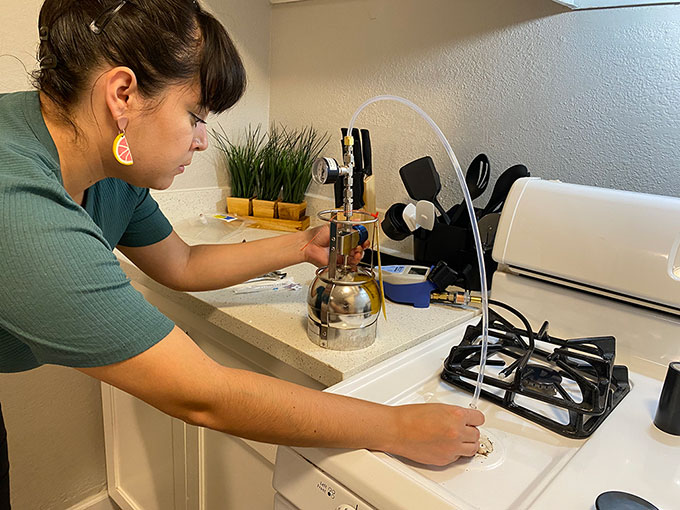Detecting Gas Smells
Knowing when something’s off with gas in your home is a serious matter. Picking up on gas smells fast can save you a world of trouble and prevent dangerous situations.
Signs of Gas Leaks
Catching a whiff of a gas leak early on is a potential lifesaver. The sneaky stuff is actually scentless and invisible, but gas folks amp it up with odorants so it reeks of sulfur or rotten eggs. Here’s how to spot a gas leak:
- Rotten Egg Smell: If you get a nasty whiff of rotten eggs, it might be a gas leak (Constellation).
- Hissing Sounds: A hiss or whistle near your oven? Gas might be creeping out.
- Dead Plants: Plants dropping dead indoors for no good reason? Could be gas.
- Bubbles in Water: Bubbles showing up in still water outside? Keep an eye out for gas issues (Constellation).
For more tips on stoves and safety, check out how does a gas stove work.
Physical Symptoms to Watch for
Breathing in natural gas can mess with your head and make you think of carbon monoxide problems. Watch out for these clues:
- Headaches: Constant headaches might mean you’ve been around gas too long.
- Dizziness: Spinning for no reason? Gas might be behind it.
- Fatigue: Feeling wiped out for no known reason can tip you off to gas issues.
- Nausea: Feeling sick a lot with no other reason? Gas exposure could be at play (Constellation).
If any of this rings a bell, get checked out and hunt down any sneaky gas leaks. For extra peace of mind, think about getting a hand-held gas detector. More on that in our gas detectors section.
Spotting gas smells and picking up on leak signs can fend off bigger problems. For more on dealing with gas scares, see actions for suspected leaks.
| Symptom | Possible Cause |
|---|---|
| Headaches | Too much gas in the air |
| Dizziness | Breathing in gas |
| Fatigue | Less oxygen because of gas |
| Nausea | Health issues from gas exposure |
Keep these pointers in mind and make sure your place stays safe from gas troubles.
Preventing Gas Hazards
Gas leaks can be more unsettling than a jump scare in a horror movie, but there’s no need to panic if you’re prepared. Being on top of things with regular check-ups and using those nifty gas detectors can cut risks way down.
Regular Appliance Inspections
You know how you take your car in for an oil change? Well, your gas appliances need their own version of a tune-up to keep them from becoming fire-breathing dragons. Regular check-ups on these machines ensure everything’s humming along nicely. Spy on that pilot light now and then; a healthy one sports a blue hue with a sprinkle of yellow. If it’s showing its wild side with orange or red, call the pros for a check-up pronto (Constellation).
Don’t skip these steps:
- Peek at hoses and connections like you’re looking for lost car keys
- Make sure those vents and exhausts aren’t stuffed up
- Keep an eye on the color and calmness of the pilot light
Importance of Gas Detectors
Gas detectors are like having a smoke alarm but for invisible, smell-like-rotten-eggs gas. Companies jazz up natural gas with some stinky stuff, so leaks are easier to sniff out. But the sneaky thing is, not every leak waves a red flag in your nose. That’s where gas detectors strut in, making sure you’re clued in before things get dicey.
Get those natural gas detectors and carbon monoxide gadgets in your corner for full coverage. They’ll catch a whiff of gas before it pumps up to danger levels. Also, get familiar with your gas shut-off valve; you’ll thank yourself if a leak ever decides to crash your party (Constellation).
Find more juicy details in our article about the cost showdowns between gas vs electric stoves.
| Device | Best Spot | Why It’s There |
|---|---|---|
| Gas Detector | Near gas gadgets | Sniffs out gases, like a hound dog |
| Carbon Monoxide Alarm | Bedrooms and lounges | Keeps tabs on carbon monoxide levels |
Stick to these game plans, and you’re way less likely to face off with a gassy menace. For other troubleshooting tips, check out our wisdom on what to do when your electric oven and stove give up and when the heating element in your electric oven decides to explode.
Causes of Gas Smells
Wondering why your kitchen suddenly smells like a gas station? A whiff of gas from your oven can be a heart-stopper, kind of like that bill surprise in your mailbox. Here’s why your oven might be giving off those noxious fumes: look at combustion compounds or blocked vents with foil residue.
Combustion Compounds
Strange as it might sound, your beloved oven could turn into a temporary art studio without you even knowing it. Ever finished a paint job or varnished some furniture nearby? Those painty vapors are sneaky. They can mingle with the air molecules and, once your oven heats up, create a kerosene-like perfume that’s as unwelcome as holiday guests (DIY Stack Exchange).
Even something as small as flicking a lighter can stir up these invisible troublemakers. But don’t sweat it too much—these nasties burn off relatively quickly, disappearing faster than your favorite leftovers.
| Potential Source | Smell Description | Goodbye Time |
|---|---|---|
| Paint, Stain, Varnish | Kerosene-style whiff | A few days |
| Cleaners | Kerosene-style whiff | A few days |
| Open Flame | Faint scent | Here today, gone tomorrow |
Blocked Vents and Foil Residue
So maybe you’ve tried that trick where you line the bottom of your oven in foil to save yourself a cleaning job. But here’s the kicker—foil can block vents! This might trap all sorts of stuff—like those pizza crust crumbs you’d rather not think about—and mess with how your oven does its cooking thing. Cue the smell of gas that isn’t quite what you’d hoped your kitchen would smell like (Angi).
It’s a good plan to only pop foil over the oven rack sections, and don’t be lazy about getting them out once you’re done cooking up a storm. Keep your oven in the clean-and-clear zone to breathe easy again.
| Issue | Cause | Simple Fix |
|---|---|---|
| Blocked Vents | Foil snuggling the vents | Ditch the foil post-cooking |
| Trapped Food Bits | Food plus foil equals oven surprise | Clean regularly |
When your oven lets off a gas smell due to combustion compounds or blocked vents, give it some TLC—or ask a pro for help. For more on oven quirks, we’ve got the lowdown on fixes like prehistoric preheat times and ovens with minds of their own turning on unaided. Keep your kitchen from smelling like a science experiment gone wrong.
Addressing Gas Odors
A whiff of gas from your oven isn’t something to ignore. Here’s how to squash those pesky smells, whether you’re rolling up your sleeves for a DIY fix or calling in the pros.
DIY Solutions
Before dialing up the experts, there are a few things you can try to clear up gas smells on your own:
-
Check for Blocked Vents:
Sometimes, that gas odor arises because oven vents are blocked. Make sure there’s no cookware, oven liners, or food clutter stuck in there causing chaos. -
Clear Residual Foil:
Leftover foil can be a mischief-maker, trapping gunk and causing blockages. Ditch any foil after cooking to ensure smooth airflow. -
Inspect for Blockages:
Peek inside your oven for any forgotten gunk or food bits. Clean up that mess to avoid any odor shenanigans. -
Ventilate Your Kitchen:
Open those windows wide and get that exhaust fan going. A little fresh air can help waft away the lingering smells, making things fresher.
Professional Intervention
If the smell sticks around or if there’s a bigger gas issue at play, it’s time to bring in the experts.
-
Consult a Gas Technician:
If the gas smell won’t quit, bring in a pro to check for leaks or any dodgy parts in your oven that need fixing. -
Routine Appliance Inspections:
Keep your oven in top shape by having regular check-ups. It’s a savvy move to catch problems before they turn into full-blown disasters. -
Immediate Emergency Response:
If a wicked gas leak or strong eggy smell fills the air, it’s evacuate-first-ask-questions-later time. Get out and call emergency services pronto.
Taking quick action on gas odors doesn’t just keep things smelling sweet; it keeps your home safe and your kitchen gadgets in tip-top shape. For more pointers, check out our guides on what to do if your gas oven takes forever to preheat or if your gas oven turns on by itself.
Safety Measures
Understanding Gas Detectors
Gas detectors are like a keen-nosed bloodhound for your home, sniffing out potential dangers from natural gas leaks. These sneaky leaks can lurk silently, making detectors superheroes in keeping your family safe. Homeowners are urged to set up these gadgets, giving a heads-up if there’s a whiff of trouble in the air.
| Type of Detector | What It Does |
|---|---|
| Natural Gas Detectors | Sniffs out natural gas leaks using specialized sensors that can detect changes in gas levels. |
| Carbon Monoxide Detectors | Senses carbon monoxide, lurking as a result of burning gas improperly, keeping air fresh and breathable. |
Though these carbon monoxide alarms won’t catch a natural gas whiff, they’re critical for catching the silent creep of carbon monoxide from faulty gas burning. By arming your home with both kinds of alarms, you’re building a fortress against any sneaky gas threats.
Immediate Actions for Suspected Leaks
Got a hunch there’s gas hanging around? Time to pop your safety cape! Here’s how you can get the heck outta dodge while keeping hazard at bay:
-
Get Outta There: Make like a tree and leave immediately! Don’t stick around to hunt the leak. And for goodness’ sake, avoid flicking switches or using any sort of electrical stuff that could make a kaboom. Hightail it to a safe spot far from the leak’s suspected lair.
-
Call the Pros: Away from the danger zone? Ring up your gas company or the rescue squad to report the stink. Make sure you’re in the clear before returning, courtesy of a professional nod of approval.
-
Spot the Symptoms: Watch out for signs that might yell “gas alert!”, such as dizziness, feeling queasy, or huffing to catch your breath. If any of these hit, it’s time for a doctor visit pronto.
-
Rely on Gas Detectors: Keep a trusty detector on duty to give a shout when air quality dips. These devices help keep everyone under your roof safe and sound.
Want to bolster your safety know-how? Peek into our other reads on how does a gas stove work and gas oven turns on by itself to manage your gas gadgets like a pro.

